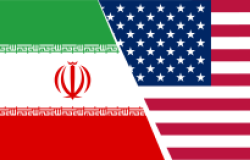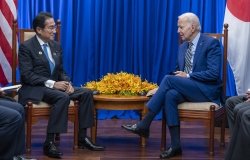From Lisbon to Lisbon: Afghanistan and Russia as Test Cases for the new EU Foreign Policy
Two new positions introduced by the Lisbon Treaty will significantly affect EU's ability to conduct foreign policy: the permanent Presidency of the European Union and the appointment of a High Representative of the Union for Foreign Affairs and Security Policy. Anne-Marie Le Gloannec argued that the EU's ability to formulate and execute a common foreign policy foreign remains questionable because the Lisbon Treaty "does not simplify representation; does not conjure up coherence; and does not muster will." Given these problems, she argued that Europeans should continue to develop institutions and cooperative representation outside the scope of EU institutions.
Overview
Two new positions introduced by the Lisbon Treaty will significantly affect EU's ability to conduct foreign policy: the permanent Presidency of the European Union and the appointment of a High Representative of the Union for Foreign Affairs and Security Policy. Anne-Marie Le Gloannec argued that the EU's ability to formulate and execute a common foreign policy foreign remains questionable because the Lisbon Treaty "does not simplify representation; does not conjure up coherence; and does not muster will." Given these problems, she argued that Europeans should continue to develop institutions and cooperative representation outside the scope of EU institutions.
The Lisbon Treaty defines the functions of these two new positions as reflecting the core ideas of the treaty and represent critical elements of future EU foreign policy: cooperation, cohesion, and consensus. As envisioned by the treaty, the new president of the European Union, Herman Van Rompuy, chairs and drives the work of the European Council. He is responsible for the preparation and continuity of initiatives within the European Council in cooperation with the president of the European Commission. He also represents the EU on a number of issues, including foreign policy. The High Representative of the Union for Foreign Affairs and Security Policy, Catherine Ashton, chairs the Foreign Affairs Council. Her primary responsibility is to coordinate various national foreign policies, in cooperation with the Commission. Moreover, in order to engender cooperation, cohesion and consensus among member states, both positions have been empowered to take initiative, an arrangement which deviates markedly from the past.
The treaty does not, however, elaborate how the President or the High Representative might take into account the different national interests of the 27 EU member states. The differences between the member states can be very different indeed, as is the case with EU policy on Russia and Afghanistan, which Le Gloannec raised as examples. The EU policy towards Russia has been stymied as much by the inability of the Commission and the Council to coordinate their work, as by the discordant views of Russia by the member states. Le Gloannec urged the High Representative to take initiative in streamlining the member states' positions on EU policy toward Russia. The speaker suggested that in re-orienting its Russia policy, the EU should attempt to engage Moscow on economic and civil society issues.
Unlike in the case of Russia, Le Gloannec argued that the EU could affect little change in Afghanistan, irrespective of the new capabilities created by Lisbon treaty. Although Europeans have contributed substantially to Afghanistan in recent years, resources, legitimacy, and public support for the intervention there are dwindling rapidly throughout Europe. Given these circumstances, the speaker suggested that the EU increase the visibility and coherence in of its Afghan policy as well as improve coordination of bilateral and civilian initiatives conducted by EU member states in the country.
By Elizabeth Zolotukhina, Program Assistant, European Studies and Hazel Han, Intern, European Studies
Christian Ostermann, Director, European Studies
Speakers
Anne-Marie LeGloannec
director of research at the Centre d'Etudes et de Recherches Internationales, Foundation Nationale des Sciences Politiques, Paris

Christian F. Ostermann
Woodrow Wilson Center
Hosted By

Global Europe Program
The Global Europe Program is focused on Europe’s capabilities, and how it engages on critical global issues. We investigate European approaches to critical global issues. We examine Europe’s relations with Russia and Eurasia, China and the Indo-Pacific, the Middle East and Africa. Our initiatives include “Ukraine in Europe” – an examination of what it will take to make Ukraine’s European future a reality. But we also examine the role of NATO, the European Union and the OSCE, Europe’s energy security, transatlantic trade disputes, and challenges to democracy. The Global Europe Program’s staff, scholars-in-residence, and Global Fellows participate in seminars, policy study groups, and international conferences to provide analytical recommendations to policy makers and the media. Read more

Cold War International History Project
The Cold War International History Project supports the full and prompt release of historical materials by governments on all sides of the Cold War. Through an award winning Digital Archive, the Project allows scholars, journalists, students, and the interested public to reassess the Cold War and its many contemporary legacies. It is part of the Wilson Center's History and Public Policy Program. Read more

History and Public Policy Program
The History and Public Policy Program makes public the primary source record of 20th and 21st century international history from repositories around the world, facilitates scholarship based on those records, and uses these materials to provide context for classroom, public, and policy debates on global affairs. Read more

Middle East Program
The Wilson Center’s Middle East Program serves as a crucial resource for the policymaking community and beyond, providing analyses and research that helps inform US foreign policymaking, stimulates public debate, and expands knowledge about issues in the wider Middle East and North Africa (MENA) region. Read more
Thank you for your interest in this event. Please send any feedback or questions to our Events staff.










